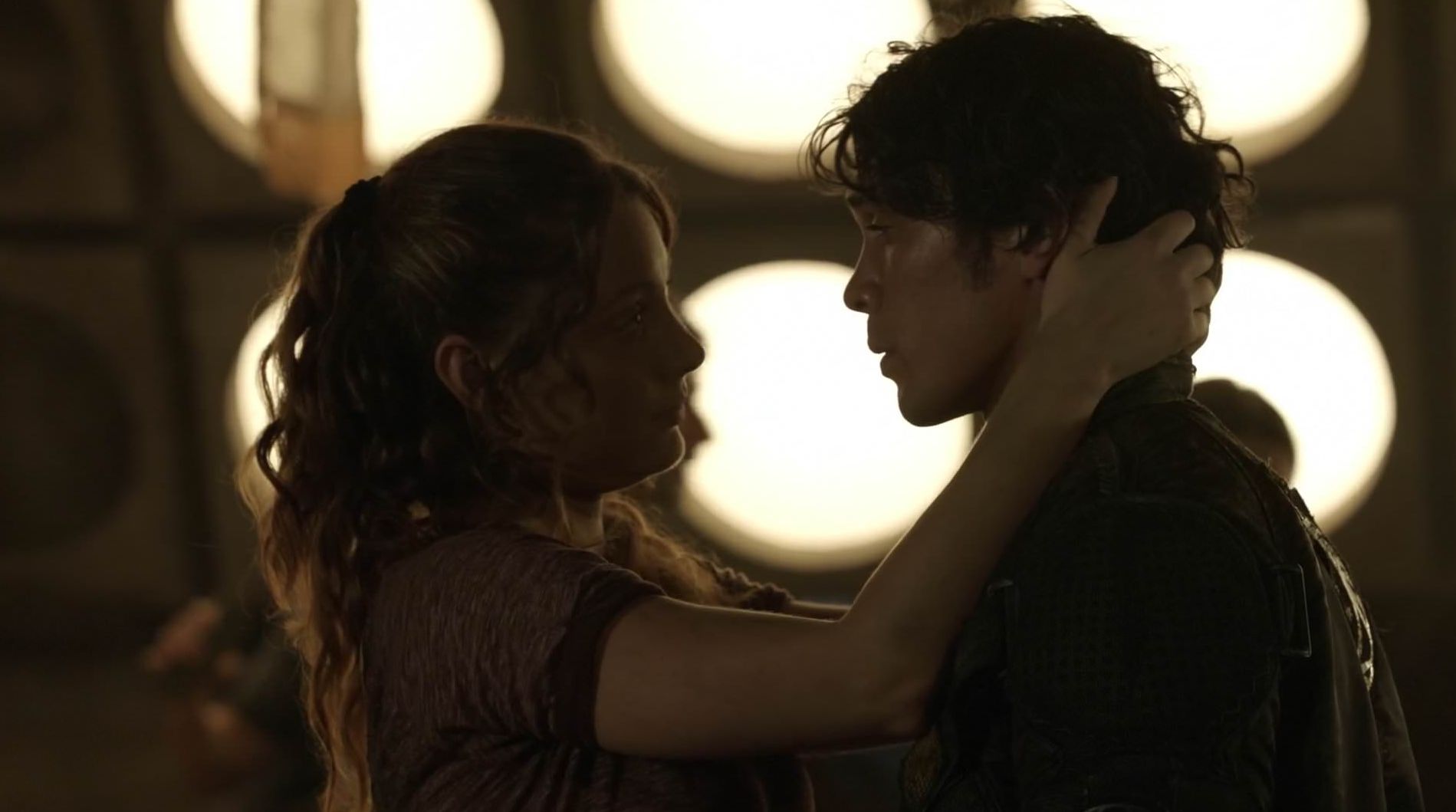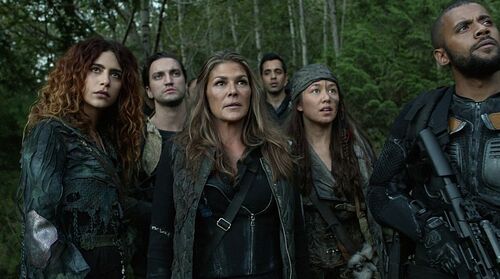
The 100 S3E3: "Ye Who Enter Here" Review
 “Ye Who Enter Here” had incredible character moments hanging off of a thinly constructed plot. As if that wasn’t damning enough, the story for this episode relied on one of the most regressive tropes possible, a major flaw for a show as progressive and subversive as The 100.
“Ye Who Enter Here” had incredible character moments hanging off of a thinly constructed plot. As if that wasn’t damning enough, the story for this episode relied on one of the most regressive tropes possible, a major flaw for a show as progressive and subversive as The 100.
let's talk about...plotting
What has always set The 100 apart from other shows is its ability to constantly surprise the viewer. From the Pilot, where a Grounder speared Jasper in the chest, to the breathtaking betrayal of Lexa in “Blood Must Have Blood Pt. 1”, The 100 has subverted typical tropes of TV, creating compelling and often chilling television.
In this episode, this strength is excellently deployed by the character of Echo. Echo is the Ice Nation grounder that saved Bellamy’s life in Mount Weather (S2 E11). He subsequently let her out of her own cage, freeing her to join the fight against Mount Weather. Of course, that didn’t go to plan (see the aforementioned betrayal of Lexa), but there was still a sense that Echo owed a debt to Bellamy.
So it was brilliant to use her as an informational Trojan Horse. Bellamy had every right to think that she was telling the truth about the Ice Nation assassin. She gained his trust by saying things like “it was wrong” for the Grounders to leave the fight at Mount Weather. She provided seemingly reliable information like the guards in the truck would be dead. It all added up.
Until, of course, it didn’t. Echo had two motivating factors for her actions. One, she did want to return the favor and save Bellamy’s life, so she got him, Octavia, and Pike out of Mount Weather.
The other motivation, of course, was the ultimate betrayal, especially to a character like Bellamy. Bellamy values loyalty above all else, and Echo exploited that to the ruthless end. She aided the assassin in the total destruction of Mount Weather, thereby killing 36 Farm Station inhabitants, injuring Raven and Sinclair, and of course murdering Gina, his girlfriend.
Oh, the murder of Gina. How I wish I could let you go.
But I can’t. Because it happened. It was a thing that happened in this episode that I wish didn’t, because honestly, it brings down not only the quality of an otherwise suspenseful episode but yes—the season as a whole. No matter what else happens this season, Gina’s death will be a motivating factor for Bellamy.
let's talk about...fridging
Before we go further, let’s talk about the plot trope of fridging, because I’m going to use that term abundantly in the next bit. Fridging is a plot trope where (usually) a woman is introduced into a story to serve a man’s plot. She has no real character definition on her own. She doesn’t motivate any plot. She doesn’t exist outside of her relationship with the protagonist. The main feature of this type of character is that she gets kidnapped, maimed, raped, or killed so that the “hero” can feel pain and go on a vengeance quest or some sort of journey for self-actualization.
Fridging is particularly egregious on a show like The 100, which not only takes particular delight in smart plot twists but also challenges our perceptions of power, femininity, masculinity, love, and queer relationships. Often, women are fridged, but so are men perceived to be “weak” (read: emotional) and queer characters. The 100 has gone to great lengths to empower the women characters, feature queer characters, and write deep emotional lives for the men. In that way, The 100 is not only subversive but progressive as well.
Gina’s death was about as regressive as you can get. She had no characterization of her own, other than being introduced to us in episode one for thirty seconds, then given the kiss of death by Bellamy in the third. While we can contrast Gina with Echo in this episode, the more direct compare/contrast is with Niylah. Niylah, operator of the trading post and barkeeper (like Gina), wasn't given a lot of screen time and also had violence acted upon her. The crucial difference being that Niylah got a story, a background, and agency in her own small plot. Leah Gibson, to her credit, played Gina with intelligence, wit, and warmth for the ten minutes she was on screen.
We all knew, didn’t we, that once Bellamy kissed Gina she was dead. I hoped not. I hoped that this was The 100 being its tricky little self by deploying my own thoughts against me. But no. It wasn’t. The Ice Nation assassin gutted Gina (if she was pregnant The 100 and I are going to have some serious words). The assassin, conveniently, left her alive on the floor instead of making sure she was dead. In that time, Gina got to commit the act that makes fridging complete: being a hero. She has enough time to conveniently radio Raven telling her that the assassin set the Mount Weather self-destruct sequence. She dies as the clock countdown flashes in her eyes.
In light of the general awesomeness of The 100, and how incredible the first half of “Ye Who Enter Here” was, this plot machination was particularly distasteful. Knowing that it will be a catalyst for a huge plot arc, as well as Bellamy’s own particular journey, is frankly disgusting.
Do better, show. Do. Better.
Other than Gina’s death there were other areas in “Ye Who Enter Here” where the plot fell short. First, the assassin timeline doesn’t make sense unless the Ice Nation was going to blow Mount Weather before Farm Station moved in. Possible, but still incredibly fast planning and execution that takes a lot of work for the audience to piece together.
Second, Bellamy and Pike killing the Grounders at the bottom of the elevator shaft seemed only to be about telegraphing future conflict between Bellamy and Octavia. Otherwise, it doesn’t make sense when a couple of lines of conversation would have done the job. Bellamy acting unreasonably when he's demonstrated tactical smarts and a cool head before (hello, the immense pressure of Mount Weather ) just doesn't play.
Third, Echo just disappearing and neither Bellamy, Pike or Octavia noticing, is just shy of being too convenient.
Lastly, it was never explained to us why Sinclair, Raven, and Gina were looking for the missile launch codes in the first place. What was their plan? Bomb Polis, where Clarke, Kane, and Abby were? Where Bellamy, Octavia, and Pike were headed? This situation gives characters something to do, and gives us some great moments, but to what end besides Gina’s death?
Upon closer inspection, the plot machinations in this episode were poorly glued together popsicle sticks trying to resemble a house.
but there was so much awesome, too.
Lest you think all was terrible with this episode, it wasn’t. The brilliant first half moved several stories and characters forward by tying both the personal to the epic in ways that recalled Lord of the Rings. Kane and Abby had a conversation that revealed both characters’ evolution. Kane and Indra are BFFs, which is more impressive and organic development. The moment between Octavia and Bellamy sitting on the Mount Weather dugout was sweet, genuine, and served to remind us of both characters’ guiding principles.
Though the plotting was shoddy, tension pulsated on screen during the intertwined Council Room, elevator shaft, and Mount Weather assassin reveal. The spectacular combination of choreography and cinematography for Sinclair and the assassin's chase and fight gave the feeling of flight and chaos. Whoever is doing The 100's fight choreography needs ALL the awards. It's truly the best I've seen on television in a long time.
Physical world-building was also on point. We were introduced to Polis! Kudos to the art and set-design on creating a medieval, steam-punk, post-apocalypse village marketplace. In one of the best scenes of the episode, Lexa trains the Nightbloods and she and Titus, her adviser, discuss her plans for peace. During those scenes, you can see the layers of strategy and the foundation for conflict between Lexa and Titus.
The other major arc of the episode to talk about is, of course, Clarke and Lexa. I saved it for the end because I honestly don’t know what to think. On one hand, I don't think it is in character for Clarke to accept Lexa’s apology for the events of Mount Weather. The show has shown us that Clarke is a master grudge-holder (see: Wells, Finn, Abby—a reminder of that even in this episode when she refuses Abby’s embrace). But it is logical that Clarke sees the Ice Nation as a greater threat and needs Lexa’s resources. Hopefully, Clarke is doing some scheming of her own.
Lexa bowing to Clarke is a significant gesture, one that is both romantic and political. Both characters are working on several levels here, and it would be foolish to assume that anything that either Lexa or Clarke does is straightforward. That two women characters, and two queer characters, get to play such depth is refreshing and monumental. It also contrasts sharply with the regressive nature of Gina’s death.
The cast performs beautifully, as always. That they make such emotional and evocative moments hit in the limited time they do is an incredible feat. Some of my favorite moments were Abby, Kane, and Indra in the marketplace, and the exchange between Bellamy and Clarke after she chooses to stay in Polis. The first is a moment of joy between friends. The second is subtle—but utter—devastation.
However, the episode MVP goes to Raven Reyes (Lindsey Morgan) and Sinclair (Alessandro Juliani). Both Lindsey and the writers have developed an incredible character whose strength, determination, and vulnerability is complete. That Sinclair, someone Raven admires and looks up to, gave her the ultimate of pep-talks provided a sweet, emotionally rich note to such a tragic episode. Even better, Raven seemed to take it to heart. It was lovely to see and beautifully acted.


